Match
Details
| 1. FC Kaiserslautern | 3–1 | Werder Bremen |
|---|---|---|
| Report | Rufer |
1. FC Kaiserslautern | Werder Bremen |
|  |
| ||||||||||||||||||||||||||||||||||||||||||||||||||||||||||||||||||||||||||||||||||||||||||||||||||||||||||||||||||||
| German Supercup | |||||||
|---|---|---|---|---|---|---|---|
| Event | 1991 DFB-Supercup | ||||||
| |||||||
| Date | 6 August 1991 | ||||||
| Venue | Niedersachsenstadion, Hanover | ||||||
| Referee | Wolf-Günter Wiesel (Ottbergen) | ||||||
| Attendance | 8,000 | ||||||
The 1991 DFB-Supercup Final decided the winner of the 1991 edition of the DFB-Supercup, a football competition contested by the winners of the previous season's West German league and cup winners, along with the East German league and cup champions.
The match was played at the Niedersachsenstadion in Hanover, and contested by both West German teams, league champions 1. FC Kaiserslautern and cup winners Werder Bremen. Kaiserslautern won the match 3–1 for their first title. [1]
| Team | Qualification for tournament | Previous appearances (bold indicates winners) |
|---|---|---|
| 1. FC Kaiserslautern | 1990–91 Bundesliga champions | 1 (1990) |
| Werder Bremen | 1990–91 DFB-Pokal winners | 1 ( 1988 ) |
Both league champions of West and East Germany met in the first semi-final, before the cup winners met a day later to qualify for the final.
Note: In all results below, the score of the finalist is given first (N: neutral; A: away).
| 1. FC Kaiserslautern | Round | Werder Bremen | ||
|---|---|---|---|---|
| Opponent | Result | 1991 DFB-Supercup | Opponent | Result |
| Hansa Rostock (A) | 2–1 | Semi-finals | Stahl Eisenhüttenstadt (N) | 1–0 |
| 1. FC Kaiserslautern | 3–1 | Werder Bremen |
|---|---|---|
| Report | Rufer |
1. FC Kaiserslautern | Werder Bremen |
|  |
| ||||||||||||||||||||||||||||||||||||||||||||||||||||||||||||||||||||||||||||||||||||||||||||||||||||||||||||||||||||

The DFB-Pokal, also known as the German Cup in English, is a German knockout football cup competition held annually by the German Football Association (DFB). Sixty-four teams participate in the competition, including all clubs from the Bundesliga and the 2. Bundesliga along with the four best teams from the 3. Liga. It is considered the second-most important club title in German football after the Bundesliga championship. Taking place from August until May, the winner qualifies for the DFL-Supercup and the UEFA Europa League unless the winner already qualifies for the UEFA Champions League in the Bundesliga.
The 1990–91 Bundesliga was the 28th season of the Bundesliga, the premier football league in West Germany. It began on 8 August 1990 and ended on 15 June 1991. FC Bayern Munich were the defending champions.

Football is the most popular sport in Germany. The German Football Association is the sport's national governing body, with 6.6 million members organized in over 31,000 football clubs. There is a league system, with the Bundesliga, 2. Bundesliga and 3. Liga on top. The winner of the Bundesliga is crowned the German football champion. Additionally, there are national cup competitions, most notably the DFB-Pokal and DFL-Supercup.
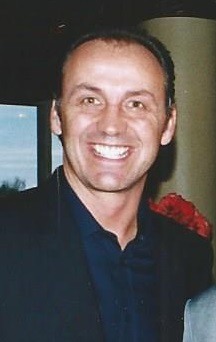
Jürgen Kohler is a World Cup-winning German footballer and manager, who played as a centre-back. Since 2018, he has been in charge of the youth team of Viktoria Köln.

The DFL-Supercup or German Super Cup is a one-off football match in Germany that features the winners of the Bundesliga championship and the DFB-Pokal. The DFL-Supercup is run by the Deutsche Fußball Liga.

The 1972 DFB-Pokal Final decided the winner of the 1971–72 DFB-Pokal, the 29th season of Germany's knockout football cup competition. It was played on 1 July 1972 at the Niedersachsenstadion in Hanover. Schalke 04 won the match 5–0 against 1. FC Kaiserslautern, to claim their 2nd cup title.
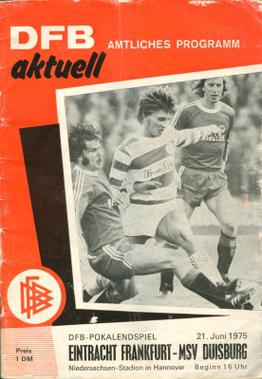
The 1975 DFB-Pokal Final decided the winner of the 1974–75 DFB-Pokal, the 32nd season of Germany's knockout football cup competition. It was played on 21 June 1975 at the Niedersachsenstadion in Hanover. Eintracht Frankfurt won the match 1–0 against MSV Duisburg, to claim their 2nd cup title.

The 1977 DFB-Pokal Final decided the winner of the 1976–77 DFB-Pokal, the 34th season of Germany's knockout football cup competition. The original final was played on 28 May 1977 at the Niedersachsenstadion in Hanover. The match between Hertha BSC and 1. FC Köln finished 1–1 after extra time, requiring a replay two days later. On 30 May 1977, once again at the Niedersachsenstadion in Hanover, 1. FC Köln won the replay 1–0 to claim their 2nd cup title.

The 1979 DFB-Pokal Final decided the winner of the 1978–79 DFB-Pokal, the 36th season of Germany's knockout football cup competition. It was played on 23 June 1979 at the Niedersachsenstadion in Hanover. Fortuna Düsseldorf won the match 1–0 against Hertha BSC after extra time, to claim their 1st cup title.
The 1990–91 NOFV-Pokal was the last edition of the East German Cup. During the competition, following German reunification in October 1990, the cup had been renamed from the FDGB-Pokal. After the 1990–91 season, the East German competitions were merged into the (West) German system, with clubs from the East now entering the DFB-Pokal.
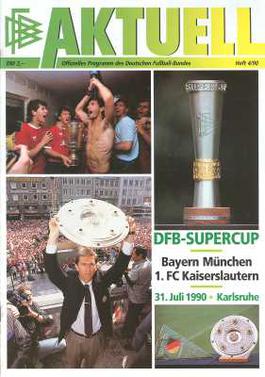
The 1990 DFB-Supercup was the fourth DFB-Supercup, an annual football match contested by the winners of the previous season's Bundesliga and DFB-Pokal competitions.

The 1989 DFB-Supercup was the third DFB-Supercup, an annual football match contested by the winners of the previous season's Bundesliga and DFB-Pokal competitions.
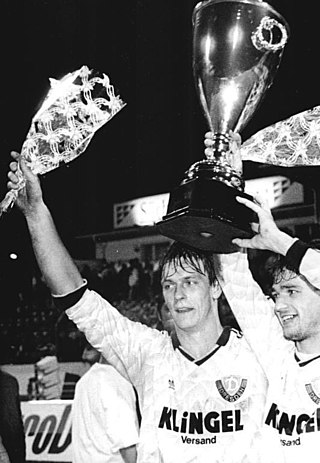
The Deutschland-Cup was a one-off football competition played in November 1990, to celebrate German reunification. The match was played one week after the dissolution of the East German Football Association and its merger with the German Football Association, and featured the reigning champions of East and West Germany, Dynamo Dresden and Bayern Munich respectively. The match, which was played at the Rudolf-Harbig-Stadion in Dresden, was won 1–0 by Dynamo.

The 1991 DFB-Supercup was the fifth edition of the DFB-Supercup. Uniquely, because Germany had just been reunified, the competition featured four teams instead of the usual two: The previous season's Bundesliga and DFB-Pokal winners, 1. FC Kaiserslautern and Werder Bremen, respectively, were joined by their counterparts from the East. Hansa Rostock had won both the NOFV-Oberliga and the NOFV-Pokal, so the losing cup finalists, Stahl Eisenhüttenstadt, took the fourth place in the competition.

The 1996 DFB-Supercup, known as the Panasonic DFB-Supercup for sponsorship purposes, was the tenth DFB-Supercup, an annual football match contested by the winners of the previous season's Bundesliga and DFB-Pokal competitions. It was the last DFB-Supercup, with the competition replaced by a DFB-Ligapokal which ran from 1997 to 2007. The supercup returned in 2010, now run by the Deutsche Fußball Liga (DFL).

The 1995 DFB-Supercup, known as the Panasonic DFB-Supercup for sponsorship purposes, was the ninth DFB-Supercup, an annual football match contested by the winners of the previous season's Bundesliga and DFB-Pokal competitions.
The 1990–91 FC Bayern Munich season was the 91st season in the club's history and 26th season since promotion from Regionalliga Süd in 1965. Bayern finished three points behind champions 1. FC Kaiserslautern in the Bundesliga. In the DFB-Pokal, Bayern were eliminated in the first round for the first time in club history. Bayern reached the semifinals of the European Cup before being eliminated by Red Star Belgrade due to an own goal in the 90th minute of the second leg. The first competitive match of the season was the DFB-Supercup on 31 July which Bayern won by a score of 4–1 over 1. FC Kaiserslautern.
The rivalry between football teams from East Germany and West Germany lasted from 1949 to 1990.

The 1992 DFB-Supercup, known as the Panasonic DFB-Supercup for sponsorship purposes, was the 6th DFB-Supercup, an annual football match contested by the winners of the previous season's Bundesliga and DFB-Pokal competitions.
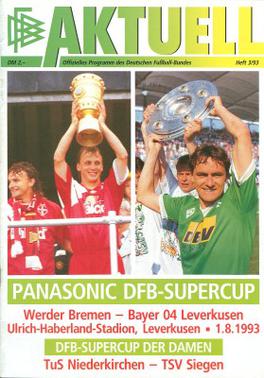
The 1993 DFB-Supercup, known as the Panasonic DFB-Supercup for sponsorship purposes, was the 7th DFB-Supercup, an annual football match contested by the winners of the previous season's Bundesliga and DFB-Pokal competitions.